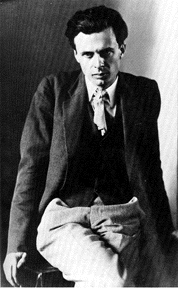 Culture & Ethics
Culture & Ethics
 Evolution
Evolution
An Uneven Classic: Aldous Huxley’s Brave New World
 Aldous Huxley died on the same day as did JFK and C.S. Lewis — November 22, 1963, fifty years ago plus a few days. It’s worth recalling, if just a mite belatedly with respect to the 50th anniversary of his death, Huxley’s well-known work of science fiction, Brave New World.
Aldous Huxley died on the same day as did JFK and C.S. Lewis — November 22, 1963, fifty years ago plus a few days. It’s worth recalling, if just a mite belatedly with respect to the 50th anniversary of his death, Huxley’s well-known work of science fiction, Brave New World.
There is no question the book is a classic, the type routinely assigned in literature classrooms. Indeed, last week we were out shopping in a large Seattle used-book store for a copy of the book for our wife. Every single copy had student-studying-for-exam type marginal notes, which Mrs. ENV will not accept in her used books. So we were out of luck.
The book’s themes are certainly relevant to our concerns in this space. Philip Ball, writing in Nature, notes that Brave New World (1932) was a slap in the face to the evolutionary positivists like J.B.S. Haldane and H.G. Wells.
When Brave New World was published in 1932, science and technology were widely seen as holding utopian promise. The first antibacterials were being developed, the Haber-Bosch process had recently begun to supply artificial fertilizers, and people were starting to fly between continents and converse across vast distances. Aldous Huxley’s bleakly satirical vision of a technocratic, totalitarian state in which the masses are engineered into stupefied contentment by eugenics, drugs, mindless hedonism and consumerism seemed to scorn that rosy view.
Although it was lauded by some, including the logician and anti-war activist Bertrand Russell, the science boosters felt that Huxley had let the side down. Nature‘s reviewer at the time of publication sniffed that "biology is itself too surprising to be really amusing material for fiction". That reviewer was Charlotte Haldane, whose then husband, the geneticist J. B. S. Haldane, was not averse to predicting the future himself — but in a more optimistic vein. (Emphasis added.)
Ball notes that Haldane and Aldous Huxley’s own brother Julian were supporters of eugenics. He also points out the H.G. Wells "felt personally offended" at Brave New World’s dystopian vision, saying, "A writer of the standing of Aldous Huxley has no right to betray the future as he did in that book." (A somewhat odd reaction, given the bleak ending of Well’s own novel The Time Machine.)
Philip Ball does not see the work as prophetic, but rather analytic of Huxley’s own times. The 1930s, that "low, dishonest decade" as W.H. Auden described it, gave reason for a sense of foreboding. William Butler Yeats complained that in those days, "The best lack all conviction, and the worst are full of passionate intensity." It’s not surprising that even Bertrand Russell sided with Aldous Huxley’s pessimism, when dictators of the worst totalitarian regimes in human history were putting their passionate intensity into high gear.
Huxley’s target was contemporary fears of totalitarian communism and fascism, wariness about eugenics and scientific triumphalism, and anxieties about consumerism ("Our Ford" is the profanity of choice) and mass docility.
What really "irks" Philip Ball today are those who cite Huxley to denounce scientific progress, such as stem cell research. "Brave New World has been co-opted as an off-the-shelf apocalyptic warning about where all such advances, from xenotransplantation (the interspecies grafting or transplanting of organs and tissues) to cloning, will lead." He claims that the real issue for Aldous Huxley was not scientific progress as such, but "the advancement of science as it affects human individuals."
Much as he denies the slippery slope, Ball does see fulfillment of certain aspects of the tale. For evidence of "mass docility," just look at texting and selfing:
All the same, one has to admit that Huxley’s vision was sometimes right on the money. His state controls its citizens not by Orwellian repression but through a drug (soma) administered to engender bovine passivity, along with the opiate of consumerism. "A really efficient totalitarian state would be one in which [leaders] control a population of slaves who do not have to be coerced, because they love their servitude," Huxley wrote…. His dystopian state uses non-stop, trivial, sensual distractions to prevent people from paying too much attention to social and political realities. One doesn’t have to be a conspiracy theorist to see those enervating distractions — infotainment, social media, celebrity-dominated news — being useful today to both authoritarian and liberal regimes.
One wonders why Ball should care about individual liberty. Why should he worry about "ways in which we can lose our humanity"? Wherein lays his concern about "science as it affects human individuals"? He’s an evolutionist, after all, writing in a staunchly pro-Darwinist journal. Evolution concerns populations, not individuals. What can he possibly mean by losing our humanity? What is it about humanity that he feels separates us from the rest of the animal kingdom, all equally products of an unplanned, unintended process of blind churning?
Ball’s review is ultimately an incoherent muddle. Like Aldous Huxley, he feels repugnance for regimes that would tempt or force a populace into docility, as if the preferred human condition is one of responsibility, creativity and liberty. But where in Darwin’s theory is that promised to any creature?
The society of AD 2540 as Huxley forecasts it seems pretty highly evolved, separated into five functional castes. How could Bertrand Russell or Aldous Huxley expect anything else? Unless these Darwinian evolutionists can define something distinctive about human nature that separates man from the animals — unless that human spirit is worth defending against tyranny — there’s no essential difference between the caste system of a beehive and that of the Central Hatchery.
Photo: Aldous Huxley/Wikipedia.
